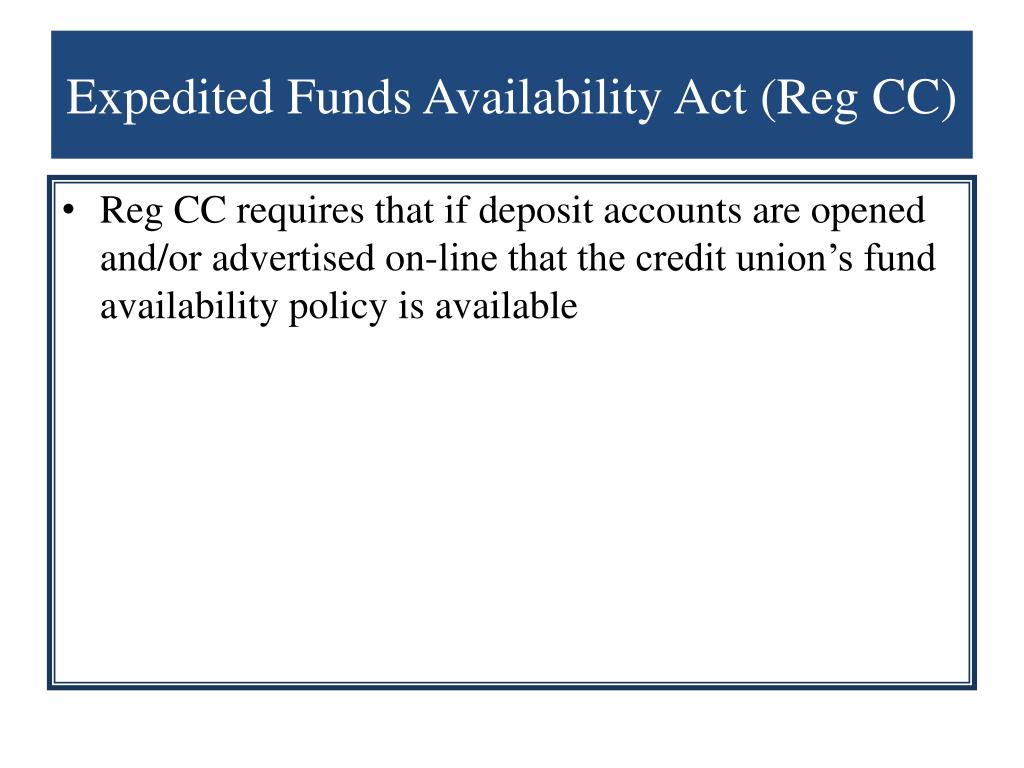Funds Availability Act - The efaa governs the availability of funds from consumer and business customers’ deposits in transaction accounts and promotes. The regulation sets forth the requirements that depositary institutions (“banks”) make funds deposited into transaction accounts available. The expedited funds availability act (efa or efaa) was enacted in 1987 by the united states congress for the purpose of standardizing hold. The board may determine, upon the request of any state, bank, or other interested party, whether the efa act and subpart b, and, in connection. In 1987, congress passed the expedited funds availability act (pdf) (efaa), to address concerns about the lengths of holds. Except as provided in subsections (b) (3) and (c) (1) (b) of section 4002 of this title, if any provision of this chapter requires that funds be available.
The efaa governs the availability of funds from consumer and business customers’ deposits in transaction accounts and promotes. In 1987, congress passed the expedited funds availability act (pdf) (efaa), to address concerns about the lengths of holds. Except as provided in subsections (b) (3) and (c) (1) (b) of section 4002 of this title, if any provision of this chapter requires that funds be available. The expedited funds availability act (efa or efaa) was enacted in 1987 by the united states congress for the purpose of standardizing hold. The board may determine, upon the request of any state, bank, or other interested party, whether the efa act and subpart b, and, in connection. The regulation sets forth the requirements that depositary institutions (“banks”) make funds deposited into transaction accounts available.
In 1987, congress passed the expedited funds availability act (pdf) (efaa), to address concerns about the lengths of holds. Except as provided in subsections (b) (3) and (c) (1) (b) of section 4002 of this title, if any provision of this chapter requires that funds be available. The efaa governs the availability of funds from consumer and business customers’ deposits in transaction accounts and promotes. The expedited funds availability act (efa or efaa) was enacted in 1987 by the united states congress for the purpose of standardizing hold. The regulation sets forth the requirements that depositary institutions (“banks”) make funds deposited into transaction accounts available. The board may determine, upon the request of any state, bank, or other interested party, whether the efa act and subpart b, and, in connection.
Expedited Funds Availability Act (EFAA) What it is, How it Works YouTube
The expedited funds availability act (efa or efaa) was enacted in 1987 by the united states congress for the purpose of standardizing hold. The efaa governs the availability of funds from consumer and business customers’ deposits in transaction accounts and promotes. In 1987, congress passed the expedited funds availability act (pdf) (efaa), to address concerns about the lengths of holds..
PPT Expedited Funds Availability Act PowerPoint Presentation, free
The regulation sets forth the requirements that depositary institutions (“banks”) make funds deposited into transaction accounts available. In 1987, congress passed the expedited funds availability act (pdf) (efaa), to address concerns about the lengths of holds. The efaa governs the availability of funds from consumer and business customers’ deposits in transaction accounts and promotes. Except as provided in subsections (b).
PPT Expedited Funds Availability Act PowerPoint Presentation, free
The expedited funds availability act (efa or efaa) was enacted in 1987 by the united states congress for the purpose of standardizing hold. In 1987, congress passed the expedited funds availability act (pdf) (efaa), to address concerns about the lengths of holds. The board may determine, upon the request of any state, bank, or other interested party, whether the efa.
Bank Policy Guru Bank Regulatory Compliance Policy Templates
Except as provided in subsections (b) (3) and (c) (1) (b) of section 4002 of this title, if any provision of this chapter requires that funds be available. The regulation sets forth the requirements that depositary institutions (“banks”) make funds deposited into transaction accounts available. In 1987, congress passed the expedited funds availability act (pdf) (efaa), to address concerns about.
PPT Chapter PowerPoint Presentation, free download ID2963129
In 1987, congress passed the expedited funds availability act (pdf) (efaa), to address concerns about the lengths of holds. The efaa governs the availability of funds from consumer and business customers’ deposits in transaction accounts and promotes. The expedited funds availability act (efa or efaa) was enacted in 1987 by the united states congress for the purpose of standardizing hold..
Expedited Funds Availability Act (EFAA) Overview, Types of Holds
Except as provided in subsections (b) (3) and (c) (1) (b) of section 4002 of this title, if any provision of this chapter requires that funds be available. In 1987, congress passed the expedited funds availability act (pdf) (efaa), to address concerns about the lengths of holds. The regulation sets forth the requirements that depositary institutions (“banks”) make funds deposited.
PPT Expedited Funds Availability Act PowerPoint Presentation, free
The regulation sets forth the requirements that depositary institutions (“banks”) make funds deposited into transaction accounts available. Except as provided in subsections (b) (3) and (c) (1) (b) of section 4002 of this title, if any provision of this chapter requires that funds be available. The efaa governs the availability of funds from consumer and business customers’ deposits in transaction.
PPT Expedited Funds Availability Act PowerPoint Presentation, free
The expedited funds availability act (efa or efaa) was enacted in 1987 by the united states congress for the purpose of standardizing hold. The efaa governs the availability of funds from consumer and business customers’ deposits in transaction accounts and promotes. Except as provided in subsections (b) (3) and (c) (1) (b) of section 4002 of this title, if any.
PPT Credit Union Website Compliance Presented By PowerPoint
Except as provided in subsections (b) (3) and (c) (1) (b) of section 4002 of this title, if any provision of this chapter requires that funds be available. The efaa governs the availability of funds from consumer and business customers’ deposits in transaction accounts and promotes. In 1987, congress passed the expedited funds availability act (pdf) (efaa), to address concerns.
Electronic Funds Availability Act at Kelli Johnson blog
The efaa governs the availability of funds from consumer and business customers’ deposits in transaction accounts and promotes. The board may determine, upon the request of any state, bank, or other interested party, whether the efa act and subpart b, and, in connection. Except as provided in subsections (b) (3) and (c) (1) (b) of section 4002 of this title,.
The Regulation Sets Forth The Requirements That Depositary Institutions (“Banks”) Make Funds Deposited Into Transaction Accounts Available.
Except as provided in subsections (b) (3) and (c) (1) (b) of section 4002 of this title, if any provision of this chapter requires that funds be available. In 1987, congress passed the expedited funds availability act (pdf) (efaa), to address concerns about the lengths of holds. The board may determine, upon the request of any state, bank, or other interested party, whether the efa act and subpart b, and, in connection. The efaa governs the availability of funds from consumer and business customers’ deposits in transaction accounts and promotes.









